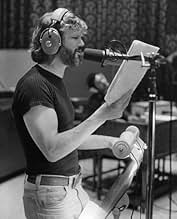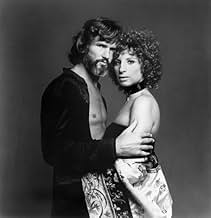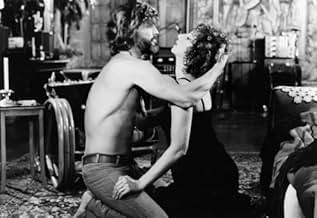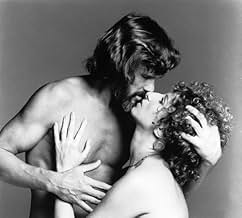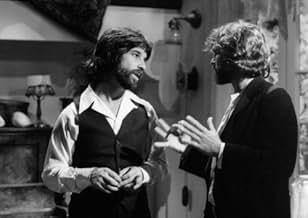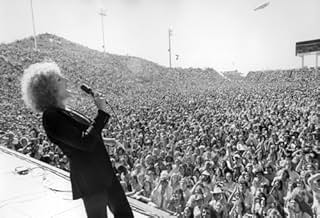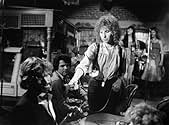Has-been singing idol John Norman Howard falls in love with young, up-and-coming songstress Esther Hoffman in Frank Pierson's version of the classic love story updated to the rock and roll e... Read allHas-been singing idol John Norman Howard falls in love with young, up-and-coming songstress Esther Hoffman in Frank Pierson's version of the classic love story updated to the rock and roll era.Has-been singing idol John Norman Howard falls in love with young, up-and-coming songstress Esther Hoffman in Frank Pierson's version of the classic love story updated to the rock and roll era.
- Won 1 Oscar
- 7 wins & 7 nominations total
Sammy Lee Creason
- The Speedway
- (as Sam Creason)
6.114.1K
1
2
3
4
5
6
7
8
9
10
Featured reviews
A convincing human drama
It's always been many people's dreams to become famous. Who could resist having tons of fans, lots of money and being able to do anything you want? It's a big change for anyone who makes this transition and most of the time, they end up cracking under pressure. Once this happens, frequently, the newly discovered celebrity will turn to drugs and other means to escape reality to find peace among themselves. But how often does someone discover the right person that'll keep him or her from going down the wrong path while in this state of glory? Now a days, it happens often enough that nobody thinks about it. Back then though, probably was a different story.
Audiences will be introduced to artist John Norman Howard (Kris Kristofferson), an entertainer who's stardom is beginning to die among his fans. He takes drugs, drinks constantly, and sings the same hits every time he's on tour. Until one night, he goes out on the town, decides to sit at a local bar and discover someone who can sing just as good if not better than him. That singer is Esther Hoffman (Barbra Streisand), a girl just trying to make a living, seeking love and hoping to make it big in show biz. It's John who's going to help her get there. Thus allowing Esther to as John puts it - "Getting small piece of the American Dream". Ergo the title of the movie.
The movie is directed by Frank Pierson who also wrote for Cool Hand Luke (1967) and Dog Day Afternoon (1975). Pierson also wrote the screenplay with two other writers who formed a fairly solid story. The only weak point is the unclear characterization Kristofferson's character. There are some motivations of John Norman Howard that aren't exactly explained. He'll do actions that should require explanations to but doesn't give one. It's understood that he's a wild and free man but every action has a motive behind it. They don't just go unexplained. Other than that, Kristofferson's performance is well acted. It's even more coincidental that a lot of the scenes displayed throughout the running time depict rather closely to what Kristofferson himself was going through at the time of his life.
Barbra Streisand also puts in a good performance as the unknowing upcoming celebrity that is forced into the life of popularity and paparazzi. Of course, when Streisand and Kristofferson are together, their chemistry feels natural. This is also displayed when these actual artists perform together as well. Audiences should appreciate that Streisand had the singing scenes filmed without voice-over work. It makes the performances and singing that much more believable and emotional. There's also a few other actors who pop in from time to time. Tony Orlando and Kristofferson's future spouse Rita Coolidge have a scene together. A very young and what appears to be sane Gary Busey plays John Norman Howard's head collaborator. Even Robert Englund from A Nightmare on Elm Street (1984) has a brief scene.
Although the films running time is about as long as your normal Michael Bay summer blockbuster (which may bore some viewers), these last few pieces help make the film as entertaining as it can be. Assisting to condense the movie as much as it could and make scenes flow was editor Peter Zinner who also edited for The Godfather (1972). Then there's Roger Kellaway's score to the film, which does try to keep the emotions high. However, it's not always present because half of the emotion is shown in the singing done by the main leads, which should satisfy most score aficionados. Lastly is Robert Surtees' cinematography where he captures very large concert audience shoots and some very beautiful rural landscape. It's an entertaining human drama with some flaws.
It lacks a little characterization and might be long for some, but the actors portray raw emotion and real performances to boot. The story is also a good representation of how quickly popularity can fall or soar.
Audiences will be introduced to artist John Norman Howard (Kris Kristofferson), an entertainer who's stardom is beginning to die among his fans. He takes drugs, drinks constantly, and sings the same hits every time he's on tour. Until one night, he goes out on the town, decides to sit at a local bar and discover someone who can sing just as good if not better than him. That singer is Esther Hoffman (Barbra Streisand), a girl just trying to make a living, seeking love and hoping to make it big in show biz. It's John who's going to help her get there. Thus allowing Esther to as John puts it - "Getting small piece of the American Dream". Ergo the title of the movie.
The movie is directed by Frank Pierson who also wrote for Cool Hand Luke (1967) and Dog Day Afternoon (1975). Pierson also wrote the screenplay with two other writers who formed a fairly solid story. The only weak point is the unclear characterization Kristofferson's character. There are some motivations of John Norman Howard that aren't exactly explained. He'll do actions that should require explanations to but doesn't give one. It's understood that he's a wild and free man but every action has a motive behind it. They don't just go unexplained. Other than that, Kristofferson's performance is well acted. It's even more coincidental that a lot of the scenes displayed throughout the running time depict rather closely to what Kristofferson himself was going through at the time of his life.
Barbra Streisand also puts in a good performance as the unknowing upcoming celebrity that is forced into the life of popularity and paparazzi. Of course, when Streisand and Kristofferson are together, their chemistry feels natural. This is also displayed when these actual artists perform together as well. Audiences should appreciate that Streisand had the singing scenes filmed without voice-over work. It makes the performances and singing that much more believable and emotional. There's also a few other actors who pop in from time to time. Tony Orlando and Kristofferson's future spouse Rita Coolidge have a scene together. A very young and what appears to be sane Gary Busey plays John Norman Howard's head collaborator. Even Robert Englund from A Nightmare on Elm Street (1984) has a brief scene.
Although the films running time is about as long as your normal Michael Bay summer blockbuster (which may bore some viewers), these last few pieces help make the film as entertaining as it can be. Assisting to condense the movie as much as it could and make scenes flow was editor Peter Zinner who also edited for The Godfather (1972). Then there's Roger Kellaway's score to the film, which does try to keep the emotions high. However, it's not always present because half of the emotion is shown in the singing done by the main leads, which should satisfy most score aficionados. Lastly is Robert Surtees' cinematography where he captures very large concert audience shoots and some very beautiful rural landscape. It's an entertaining human drama with some flaws.
It lacks a little characterization and might be long for some, but the actors portray raw emotion and real performances to boot. The story is also a good representation of how quickly popularity can fall or soar.
Don't watch too closely now...
I enjoyed this 70's remake of the marvellous Judy Garland / James Mason classic from the 50's (itself a remake, film snobs) more than I expected without accepting that one isolated minute in it was better than its counterpart in the predecessor. A rocky update of the story is a decent idea and in fact lends itself well to the story-line and if the execution is a bit clunky and now dated, that's both pardonable and understandable.
Things I liked - well let's start with Kris Kristofferson who, with the more difficult part, certainly convinces as a hell-raising rock star, fuelled by drugs and alcohol, aware of tastes and fashions passing him by but with enough perception to see Streisand's Esther as the future. It's fun trying to pick out rock prototypes for his John Norman Howard character - I'm between Jim Morrison and Leon Russell myself, the latter married at the time ironically to sultry singer Rita Coolidge who herself gets a brief cameo appearance, while Howard's behaviour at Streisand's little night club where he "discovers" her recalls an infamous out of control episode in the "lost weekend" period in John Lennon's life, if memory serves. A pity they couldn't have trusted the writer of classics like "Help Me Make It Through The Night" and "Me And Bobby McGee" to contribute some of his own songs to the soundtrack and certainly his signature song here "Watch Closely Now" gets done to death.
I also quite enjoyed the soundtrack. I'm no fan of La Diva Streisand's singing or indeed acting but at least in her vocals she exercises some restraint and delivers a surprising variety of material demonstrating at least some versatility on her part, from the title-theme ballad "Evergreen", (the gorgeous music to which was, surprisingly enough written by her), light Labelle-type funk of "I Believe in Love" and the big torch ballad "The Woman in the Moon" which while beneath Judy's "The Man That Got Away", covers the same territory in a still acceptable way.
Things not to like - Streisand herself does a reasonable job and initially tones down her trademark "kooky" and "sensitive" personae a bit but you never really believe in her as a real person. Unfortunately as the film progresses so does her profile and we get embarrassingly lame scenes with the couple coo-ing at each other in various locations including a candle-surrounded bath scene, Streisand overacting furiously as she argues with a cassette-tape of Howard's voice after he's done his James Dean-type exit from the planet and worst of all that single long shot of her singing the finale medley, which is when you appreciate that yes, it's just another Barbie vanity exercise after all (especially when you see her name down as executive producer).
The dialogue is pretty rock-star cliché throughout and some of the situations come across very second-hand too (Howard snorting up before every show, his assaults on a critical dee-jay, Streisand's MOR music somehow wowing a crowd of rock 'n' rollers at a benefit gig) and of course the familiarity with the story reduces the surprise element of some of the plot developments.
All told though, long as it was, there were far worse films than this made in the 70's. By the way, what a pity they never released the version of "Evergreen" with Kristofferson harmonising on the middle section - it works a treat and adds to an already very pretty melody.
Things I liked - well let's start with Kris Kristofferson who, with the more difficult part, certainly convinces as a hell-raising rock star, fuelled by drugs and alcohol, aware of tastes and fashions passing him by but with enough perception to see Streisand's Esther as the future. It's fun trying to pick out rock prototypes for his John Norman Howard character - I'm between Jim Morrison and Leon Russell myself, the latter married at the time ironically to sultry singer Rita Coolidge who herself gets a brief cameo appearance, while Howard's behaviour at Streisand's little night club where he "discovers" her recalls an infamous out of control episode in the "lost weekend" period in John Lennon's life, if memory serves. A pity they couldn't have trusted the writer of classics like "Help Me Make It Through The Night" and "Me And Bobby McGee" to contribute some of his own songs to the soundtrack and certainly his signature song here "Watch Closely Now" gets done to death.
I also quite enjoyed the soundtrack. I'm no fan of La Diva Streisand's singing or indeed acting but at least in her vocals she exercises some restraint and delivers a surprising variety of material demonstrating at least some versatility on her part, from the title-theme ballad "Evergreen", (the gorgeous music to which was, surprisingly enough written by her), light Labelle-type funk of "I Believe in Love" and the big torch ballad "The Woman in the Moon" which while beneath Judy's "The Man That Got Away", covers the same territory in a still acceptable way.
Things not to like - Streisand herself does a reasonable job and initially tones down her trademark "kooky" and "sensitive" personae a bit but you never really believe in her as a real person. Unfortunately as the film progresses so does her profile and we get embarrassingly lame scenes with the couple coo-ing at each other in various locations including a candle-surrounded bath scene, Streisand overacting furiously as she argues with a cassette-tape of Howard's voice after he's done his James Dean-type exit from the planet and worst of all that single long shot of her singing the finale medley, which is when you appreciate that yes, it's just another Barbie vanity exercise after all (especially when you see her name down as executive producer).
The dialogue is pretty rock-star cliché throughout and some of the situations come across very second-hand too (Howard snorting up before every show, his assaults on a critical dee-jay, Streisand's MOR music somehow wowing a crowd of rock 'n' rollers at a benefit gig) and of course the familiarity with the story reduces the surprise element of some of the plot developments.
All told though, long as it was, there were far worse films than this made in the 70's. By the way, what a pity they never released the version of "Evergreen" with Kristofferson harmonising on the middle section - it works a treat and adds to an already very pretty melody.
My A STAR IS BORN
This was the A STAR IS BORN I knew, released in 1976. It was the third of four (1937, 1954, 1976 and, now, 2018). I'm pretty sure I had the soundtrack on repeat, the songs still stir memories of my college years. Streisand vocals are spectacular. Kris Kristofferson was beautiful. This version made a complete contextual leap from Movie Star to Rock Star. It garnered 4 Oscar nominations, all for music and sound, and won for Best Song. Now, rewatching it, I see it had some rough spots, in terms of acting and writing, but I'll still go with a rating that harkens back to my first experience of it, making it a 7.5 (sweet good) out of 10. {Drama, Music, Romance}
Loved it way more than I expected to
I was fully expecting to dislike this version of A Star Is Born, since I'd already seen the 1954 version and loved it. I'd also already seen the 1937 original, and while it wasn't as good as the remake, I still appreciated it. My mom said she couldn't stand the 1976 version, and we usually have pretty similar taste, especially when it comes to musicals. Surprise, surprise, I loved it.
The reason I was able to enjoy A Star Is Born so much is because I pretended it was a completely different movie. If you've seen either of the two earlier versions and expect a traditional remake, you'll probably hate it. John Gregory Dunne, Joan Didion, and Frank Pierson may have based their concept on a previous story, but they've written a completely different script. So, for the purpose of telling you my thoughts on the film, I won't compare it at all to the Judy Garland version.
Kris Kristofferson might be the only person in the world who can pull off a bearded, '70s look while still coming across as hygienic. It doesn't make sense that I think he's wildly attractive, since I usually hate that look, but I was in heaven with the amount of eye candy in this movie. Perfectly cast as a popular rock star, he starts the movie past his peak. He drinks, snorts cocaine, forgets his lyrics onstage, and performs outrageous, life-threatening stunts. He chances upon Barbra Streisand singing in a nightclub and is so impressed with her talent, he propels her to stardom. And of course, they fall in love.
I really am surprised by how much I liked this movie, since so much of it isn't usually my cup of tea. The 1970s isn't my favorite decade, and I usually find the clothes and hairstyles irritating. With exception to two of the plentiful songs in the movie, I didn't really like the music. Barbra Streisand's character has plenty of bite to her, which I don't usually find sympathetic. Somehow, putting all the elements together worked beautifully. Somehow, it made total sense that Barbra gave Kris attitude when they were first getting to know each other. I won't be buying the soundtrack, but Barbra's vocal talent was extremely impressive; it was very understandable that audiences in the film were wowed by her.
Both leads put their whole hearts into their performances, and even though this was the third time I'd seen the story, I still cried during each of their "big scenes". If you know the story, you know which ones they are. I'd always thought of Kris as just a good-looking singer, but I was surprised by how much dramatics he poured into his scenes. Barbra is always a good performer, and in her romantic one-on-one scenes, she's tender and vulnerable. She's been paired up with a very long list of good-looking leading men-Robert Redford, Ryan O'Neal, Jeff Bridges, Omar Sharif, Nick Nolte, and young Mandy Patinkin-and I've never seen her with greater, sweeter, lovelier chemistry than with Kris Kristofferson. The way they look at each other is so beautiful, like how Jack Carson looked at Doris Day in Romance on the High Seas. If you like the Oscar-winning song "Evergreen", you'll love the scene in the movie when they sing it together.
My advice is to either watch this version first or forget you've seen any other version when you rent it. He's gorgeous, she's in her perm-prime, and if you like '70s rock, you'll really love it.
The reason I was able to enjoy A Star Is Born so much is because I pretended it was a completely different movie. If you've seen either of the two earlier versions and expect a traditional remake, you'll probably hate it. John Gregory Dunne, Joan Didion, and Frank Pierson may have based their concept on a previous story, but they've written a completely different script. So, for the purpose of telling you my thoughts on the film, I won't compare it at all to the Judy Garland version.
Kris Kristofferson might be the only person in the world who can pull off a bearded, '70s look while still coming across as hygienic. It doesn't make sense that I think he's wildly attractive, since I usually hate that look, but I was in heaven with the amount of eye candy in this movie. Perfectly cast as a popular rock star, he starts the movie past his peak. He drinks, snorts cocaine, forgets his lyrics onstage, and performs outrageous, life-threatening stunts. He chances upon Barbra Streisand singing in a nightclub and is so impressed with her talent, he propels her to stardom. And of course, they fall in love.
I really am surprised by how much I liked this movie, since so much of it isn't usually my cup of tea. The 1970s isn't my favorite decade, and I usually find the clothes and hairstyles irritating. With exception to two of the plentiful songs in the movie, I didn't really like the music. Barbra Streisand's character has plenty of bite to her, which I don't usually find sympathetic. Somehow, putting all the elements together worked beautifully. Somehow, it made total sense that Barbra gave Kris attitude when they were first getting to know each other. I won't be buying the soundtrack, but Barbra's vocal talent was extremely impressive; it was very understandable that audiences in the film were wowed by her.
Both leads put their whole hearts into their performances, and even though this was the third time I'd seen the story, I still cried during each of their "big scenes". If you know the story, you know which ones they are. I'd always thought of Kris as just a good-looking singer, but I was surprised by how much dramatics he poured into his scenes. Barbra is always a good performer, and in her romantic one-on-one scenes, she's tender and vulnerable. She's been paired up with a very long list of good-looking leading men-Robert Redford, Ryan O'Neal, Jeff Bridges, Omar Sharif, Nick Nolte, and young Mandy Patinkin-and I've never seen her with greater, sweeter, lovelier chemistry than with Kris Kristofferson. The way they look at each other is so beautiful, like how Jack Carson looked at Doris Day in Romance on the High Seas. If you like the Oscar-winning song "Evergreen", you'll love the scene in the movie when they sing it together.
My advice is to either watch this version first or forget you've seen any other version when you rent it. He's gorgeous, she's in her perm-prime, and if you like '70s rock, you'll really love it.
When you want the best version, see this last!
This is the best version of this story, no matter how many times it is made over. Save the best for last.
Did you know
- TriviaKris Kristofferson said, "Filming with Barbra Streisand is an experience which may have cured me of the movies."
- GoofsAfter John Norman crashes his motorcycle, and Esther runs to him, there are dirty hand prints on the back of her blouse before John Norman pulls her down in the dirt and puts his hands on her back.
- Quotes
Esther Hoffman: You can trash your life but you're not going to trash mine.
- Crazy creditsMs. Streisand's clothes from ... Her Closet.
- Alternate versionsStreisand interpolated previously unused footage for the film's 2018 release on Netflix. Original footage restored a guitar version of "Evergreen" previously cut to condense the film. The finale "With One More Look at You/Watch Closely Now" was re-edit from a single take to a more enhanced visual.
- ConnectionsEdited into Barbra Streisand: Woman in Love (1981)
- How long is A Star Is Born?Powered by Alexa
Details
- Release date
- Country of origin
- Language
- Also known as
- Nace una estrella
- Filming locations
- Empire Ranch, Sonoita, Arizona, USA(newly built honeymoon home)
- Production companies
- See more company credits at IMDbPro
Box office
- Budget
- $6,000,000 (estimated)
- Gross US & Canada
- $80,000,000
- Gross worldwide
- $80,000,115
- Runtime
- 2h 19m(139 min)
- Sound mix
- Aspect ratio
- 1.85 : 1
Contribute to this page
Suggest an edit or add missing content





